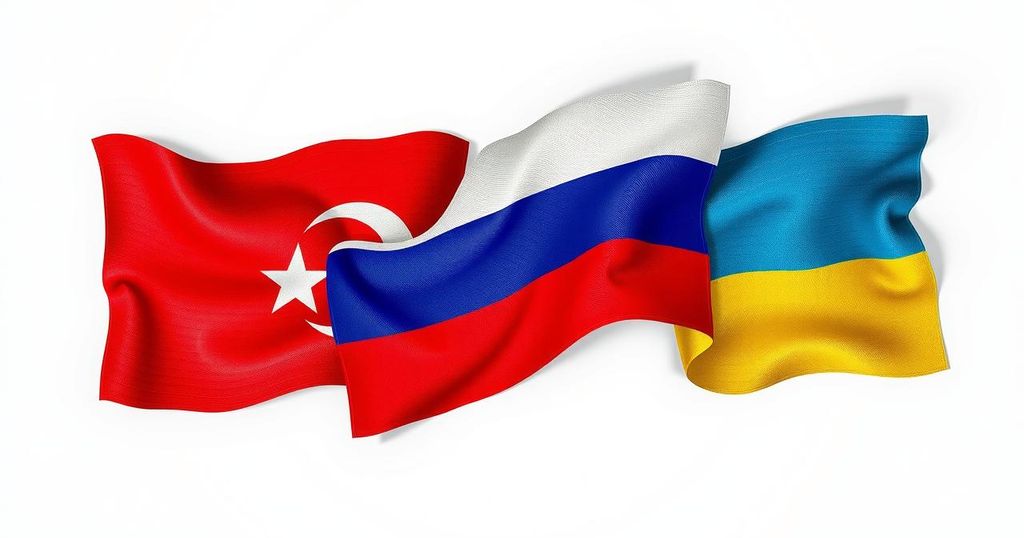World news
AFRICA, ANKARA, ASIA, DIPLOMACY, EUROPE, EUROPE/ASIA, FIGHTER JETS, INTERNATIONAL RELATIONS, ISTANBUL, KURDISTAN WORKERS ’ PARTY, NORTH AMERICA, PKK, PUTIN, ROYAL UNITED SERVICES INSTITUTE, RUSI, RUSSIA, RUSSIA-UKRAINE WAR, RUSSIAN INVASION OF UKRAINE, SYRIA, TURKEY, TURKIYE, UKRAINE, UNITED STATES, US, VLADIMIR PUTIN, VOL, WAR, ZE
Elena Martinez
0 Comments
Istanbul Talks Emphasize Turkiye’s Diplomatic Balancing Act Amidst Russia-Ukraine Conflict
Turkiye navigates a delicate balance between supporting Ukraine and maintaining ties with Russia. Recent talks in Istanbul marked the first direct discussions since the war began, although President Putin did not attend. Despite this, Turkiye’s role as a mediator remains significant, showcasing its diplomatic influence in the region amidst ongoing tensions and complexities.
In Istanbul recently, discussions underscored the balancing act that Turkiye faces between supporting Ukraine and maintaining its relationship with Russia. Expectations were high for a meeting between Russian President Vladimir Putin and Ukrainian President Volodymyr Zelenskyy, marking their first sit-down since the war erupted in 2022. However, those hopes were dashed when Russia announced that Putin would not attend, though delegations from both nations still engaged in talks, leading to an agreement on a prisoner swap.
This meeting represented the first direct dialogue between Russia and Ukraine since early in the conflict, and it took place against the backdrop of Turkiye’s ongoing diplomatic ambitions. The country has previously served as a mediator in several instances, including during the war’s early days in 2022. Although an actual tête-à-tête between Putin and Zelenskyy would have been a crowning moment for Turkiye, analysts suggest the mere involvement in ongoing discussions is an achievement in itself.
“Turkiye stands to win diplomatically whichever way the talks go,” remarked Ziya Meral from the Royal United Services Institute. He noted that it validates Ankara’s aspiration to be a key negotiating player, especially as it engages both the U.S. and Russia in its diplomatic efforts. Over the last decade and a half, Turkiye has increasingly positioned itself as a vital mediator, extending its influence across various regions while managing its complex relations in the context of the Russia-Ukraine war.
Omer Ozkizilcik from The Atlantic Council pointed out that Turkiye has initiated a peace process distinct from U.S. involvement, creating what some call a new model of negotiation—one that leverages its own diplomatic, economic, and geopolitical interests. While Turkiye has its objectives in the disputes it mediates, it is managing to project itself as a trustworthy intermediary, even with its military support for Ukraine.
The delicate nature of Turkiye’s position has not been without strife. From its early condemnation of Russia’s actions to the implementation of the Montreux Convention, Turkiye has carved out a role of opposition against Russian expansionism. Simultaneously, it has engaged with Russia in various conflicts across the region, including Libya and Syria, despite having conflicting interests in those arenas.
The relationship was notably tested when Turkiye shot down a Russian fighter jet in 2015, which complicated the countries’ previously cordial ties. However, efforts to reconcile were made, leading to a rebuilding of the partnership between Ankara and Moscow. Throughout Turkey’s support for Ukraine, such as supplying drones, Russia has seemed willing to overlook these actions, likely due to their broader economic and diplomatic ties.
As a NATO member, Turkiye maintains a unique position, navigating a path between appeasing Western allies and engaging with Moscow—often diverging from typical NATO protocols. This includes moments of opposing Western sanctions against Russia and almost derailing Finland and Sweden’s NATO membership bids.
Despite some contentious issues, such as military engagements in Syria, Turkey’s ability to compartmentalize its disputes with Russia has helped maintain a functional rapport. Likewise, its cooperation with Ukraine continues to evolve. Turkey played a crucial role in facilitating a grain export deal for Ukraine in 2022, and its neighbors are keenly aware of this support.
President Zelenskyy has expressed gratitude toward President Erdogan for facilitating dialogue, and he emphasized Ukraine’s desire for peace, which adds a distinct note of mutual understanding between the two nations. This relationship affords Turkiye additional leverage in managing its ties with Russia, all while aiming to fulfill its own national ambitions.
Overall, Turkiye’s hosting of high-stakes discussions positions it as a significant diplomatic entity looking both east and west. If these talks lead to any tangible outcomes, it could increase Turkiye’s prestige on the global stage.
In sum, the recent talks in Istanbul reflect Turkiye’s dual commitments to both Russia and Ukraine and cement its role as a mediator in a complex geopolitical landscape. The situation showcases its strategic maneuvering and potential diplomatic gains going forward.
The recent talks in Istanbul shed light on Turkiye’s unique position between Russia and Ukraine, revealing its intricate diplomatic balancing act. With both parties still agreeable to negotiations following the absence of President Putin, Turkiye’s role stands reaffirmed. Analysts suggest that even without a direct meeting between the two nations’ leaders, Turkiye has enhanced its diplomatic clout. Overall, the outcome of these discussions could bolster Turkiye’s reputation internationally, while emphasizing its importance in regional geopolitics.
Original Source: www.aljazeera.com




Post Comment